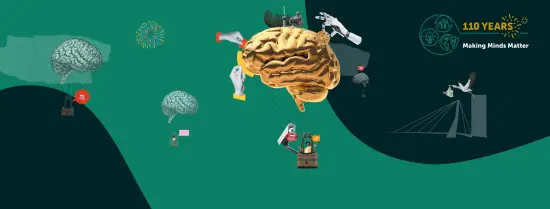
Our university is celebrating its 110th anniversary, the 22nd Lustrum! Our founding fathers surely couldn’t have imagined how, in 2023, we continue our educational and impactful endeavors at our Woudestein campus and other locations in Rotterdam, The Hague and around the world. Our community now includes a diverse range of staff and students, engaged in a wide variety of research with a clear mission to improve the world through education and research.
Of course, it’s hard to predict what our university will look like in the next 110 years. Nevertheless, as a university, we must prepare ourselves as best as possible to play a crucial role as a scientific institution in order to find smart, sustainable solutions for big issues such as poverty, social inequality, climate change, pandemics and human rights. After all, this our university’s entire reason for being – both in the present and in the future.
As we celebrate the 110th Dies Natalis, we will embark on a journey to explore new horizons. We seek to answer how Erasmus University Rotterdam can maintain it status as a top university creating positive societal impact for the next 110 years. Therefore, the theme of our 110th Dies Natalis, taking place on Wednesday 8 November 2023, is as follows:
‘Making Minds Matter: New Horizons’.
Our programme features three speakers who represent elements of our motto ‘Making Minds Matter’:
Academic prizes awarded at the 110th Dies Natalis
During the 110th Dies Natalis, awards will be presented to outstanding researchers and students of our university. By doing so, we recognise the talent we have and express our appreciation for scientists and students who have made a significant contribution.

Erasmus University Rotterdam has set itself the goal of becoming a CO2-neutral university by 2024. To achieve this goal, we are making our campus, education and research more sustainable.
Sustainability is also central to the organisation of the Dies Natalis. Together with our production partner Bee Agency and all suppliers, EUR is making an effort to create an event with the smallest possible carbon footprint. By compensating the unavoidable emissions, we ultimately create a CO2-positive event!
Catering
- We use seasonal products as much as possible
- All products are supplied by local suppliers
- We do not serve meat dishes
- We only use sustainable solutions for serving
- Quantities are adjusted to prevent food waste
For all the catering around the Dies Natalis, we will establish the total food footprint together with Vitam catering en Erasmus Food Lab. With this we indicate our environmental impact for this event. During the reception, which takes place after the event, there is the opportunity to exchange ideas about sustainable catering with students from Erasmus Food Lab. The sustainable catering is supported by a video that can be viewed on the spot.
Decor en furnishing
To avoid waste and unnecessary production of materials, the decor is hired from sustainable suppliers. In this way, no pieces of scenery are made especially for this project, but we make creative and efficient use of existing parts, which will also be used for other concepts after our project. In addition, this supplier is used for the decoration of the event at other locations at the university.
Energy
Erasmus University Rotterdam makes as much use as possible of self-generated sustainable energy, for example by using solar panels. Around the Dies Natalis we actively reduce energy consumption by using intelligent lighting, LED lamps and adjusting ventilation and temperature control according to the actual number of attendees.
Transport and transportation
Our own staff, the staff of our production partner and our suppliers limit the use of polluting transport methods. We prefer to use bicycles or public transport. Sometimes, however, it is unavoidable to use a car or truck, for example to transport large materials. In such cases, electric vehicles are preferred.
Compensation of emissions
It is inevitable that the Dies Natalis will also have a negative impact on the environment, no matter how much effort we put into mitigation measures. That is why the EUR finds it important to fully compensate the emissions of the event, and we go even further. With this CO2-positive event, we are setting the standard for the future!
Wat can you do?
Transport and transportation
Choose green transport! We ask our guests to come to the campus by bike or public transport if possible. If that is not possible, we recommend the use of an electric (rental) car and/or shared transport. There are already many initiatives in this field:
- Electric cargo bicycles from BAQM
- Jump bikes from Lime
- Cars from Greenwheels
- Felyx scooters
- Carpooling with Toogethr
Would you like to know more about what our university is doing in the field of sustainability? Or would you like to contribute to it yourself, in any way you can? Read about all our innovations in the field of sustainability.



